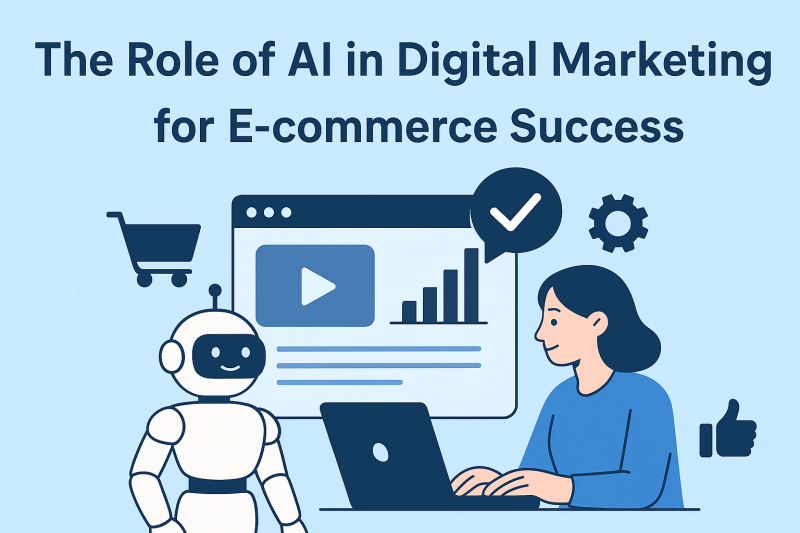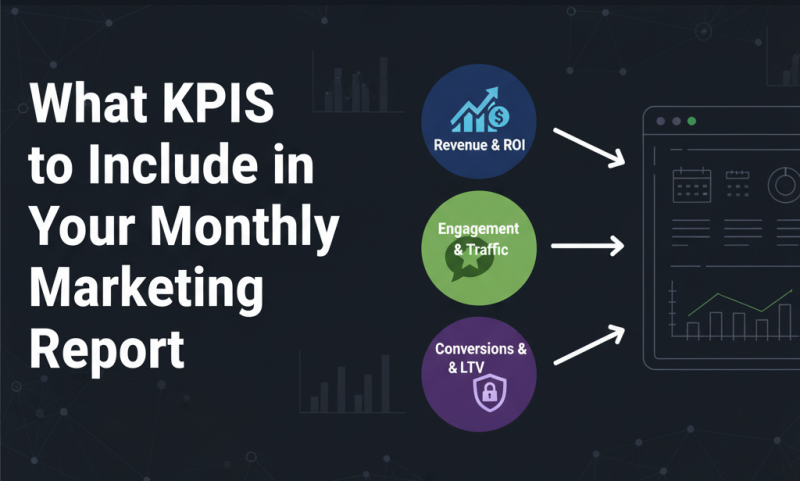
Artificial Intelligence (AI) is transforming the way e-commerce businesses connect with customers, manage campaigns, and make decisions. What once required large teams and endless manual effort can now be automated, optimized, and personalized using AI tools.
In this guide, we’ll explore how to use AI in digital marketing for e-commerce, from improving customer experience to increasing sales. Whether you’re running a small online shop or managing a large e-commerce platform, AI can help you grow smarter and faster.
What Is AI in Digital Marketing?
AI in digital marketing refers to using machine learning algorithms and data analysis to automate, predict, and improve marketing activities. These tools can analyze customer behavior, personalize experiences, optimize ads, and even generate content.
For e-commerce, AI is especially valuable because it helps brands understand customers on a deeper level. With every click, search, and purchase, AI learns what users want — and helps marketers deliver exactly that.
1. Personalized Product Recommendations
One of the most visible uses of AI in e-commerce marketing is product recommendation systems. When you visit an online store and see “You may also like” or “Recommended for you,” that’s AI in action.
AI algorithms analyze browsing patterns, purchase history, and even time spent on certain pages to predict what each customer might want next. Platforms like Amazon, eBay, and Shopify stores rely heavily on this technology to boost average order value and conversion rates.
How it helps:
- Increases upselling and cross-selling opportunities
- Builds a more personal shopping experience
- Reduces bounce rate by showing relevant products
2. Smarter Email Marketing Campaigns
Email remains one of the strongest marketing channels in e-commerce, and AI makes it even more effective. AI tools can segment your audience, send emails at the best time, and personalize subject lines or product recommendations based on user behavior.
For example, AI can automatically send reminder emails to users who added items to their carts but didn’t complete the purchase. It can also test which email formats perform better (A/B testing) and continuously learn from results.
How it helps:
- Improves open and click-through rates
- Reduces unsubscribe rates
- Saves time through automation
Popular tools like Mailchimp, Klaviyo, and HubSpot now offer AI-driven features for e-commerce automation, making it easier for marketers to create personalized campaigns with minimal effort.
3. Chatbots and Virtual Assistants
AI-powered chatbots have become essential in modern e-commerce. They help customers 24/7, answer frequently asked questions, and guide them through the buying process.
Unlike traditional chat support, AI chatbots learn from previous interactions and improve over time. They can recommend products, handle basic troubleshooting, and even process returns — all without human involvement.
How it helps:
- Enhances customer service response time
- Reduces support costs
- Improves overall customer satisfaction
Platforms like Shopify, Zendesk, and Drift integrate AI chatbots that can be customized to fit your brand’s tone and goals.
4. AI-Powered Content Creation
Creating high-quality content consistently is a challenge for any marketing team. AI tools can assist in generating product descriptions, blog posts, ad copies, and social media captions.
While human creativity is still essential, AI can help you speed up the process by suggesting keywords, optimizing structure, or providing content outlines based on SEO data. Tools like Jasper, Copy.ai, and Grammarly use AI to improve tone, clarity, and engagement.
How it helps:
- Saves time on repetitive writing tasks
- Maintains consistent brand voice
- Optimizes content for SEO automatically
5. Predictive Analytics for Smarter Decisions
AI doesn’t just react to customer behavior, it predicts it. Predictive analytics uses historical data to forecast future trends, helping e-commerce businesses plan better campaigns and manage inventory efficiently.
For example, AI can identify which products are likely to trend next month or which customers are at risk of churning. With this information, marketers can act before losing potential revenue.
How it helps:
- Improves decision-making based on data
- Reduces inventory waste
- Boosts marketing ROI
Tools like Google Analytics (with AI insights), Salesforce Einstein, and MyDataNinja help marketers track performance and make data-driven decisions.
6. Dynamic Pricing
AI also helps e-commerce stores adjust prices dynamically based on demand, competition, and other market factors. For instance, if competitors lower prices or demand spikes for a specific product, AI can automatically adjust your pricing strategy to stay competitive.
How it helps:
- Maximizes profits in real time
- Keeps you competitive in fast-changing markets
- Improves conversion rates with smart discounts
Large e-commerce platforms and travel sites use this method constantly, but even smaller online shops can benefit from dynamic pricing tools integrated into platforms like WooCommerce or Shopify.
7. AI in Paid Advertising
AI plays a major role in optimizing paid ad campaigns across Google, Meta, and other platforms. Smart algorithms can determine the best audience, ad format, and bidding strategy for each campaign.
Instead of manually adjusting ad sets, marketers can rely on AI-powered automation to allocate budgets efficiently and test creatives automatically. Google’s Performance Max and Meta Advantage+ are examples of how AI enhances ad performance with minimal manual effort.
How it helps:
- Lowers cost per conversion
- Improves targeting precision
- Saves time through smart automation
8. Visual Search and Image Recognition
AI has enabled customers to search for products using images instead of text. For example, a shopper can upload a photo of a dress they like, and the AI finds similar products available in your store.
This technology improves user experience, especially for fashion, furniture, and beauty brands, where visual appearance matters most.
How it helps:
- Simplifies product discovery
- Increases engagement rates
- Enhances mobile shopping experience
Platforms like Pinterest and Google Lens have made visual search mainstream, and e-commerce stores can now integrate similar features through APIs or third-party plugins.
9. Customer Insights and Behavior Analysis
AI can process large amounts of data to find patterns in customer behavior — such as what causes people to abandon carts or which campaigns drive the most loyal buyers. These insights help refine marketing strategies and improve retention.
Using AI-powered analytics tools, e-commerce brands can track user journeys more accurately and identify where to improve.
How it helps:
- Strengthens customer retention strategies
- Improves marketing personalization
- Provides deeper insights into buying behavior
Final Thoughts
AI is not just a trend; it’s becoming the backbone of modern e-commerce marketing. From personalizing customer experiences to predicting future trends, AI gives marketers the tools to make smarter, faster, and more data-driven decisions.
You don’t need to be a tech expert to start using AI in your marketing. Begin with simple tools, chatbots, automated emails, or AI analytics, and gradually expand as your business grows.
AI can’t replace human creativity or empathy, but it can make your e-commerce marketing more intelligent, efficient, and profitable.








